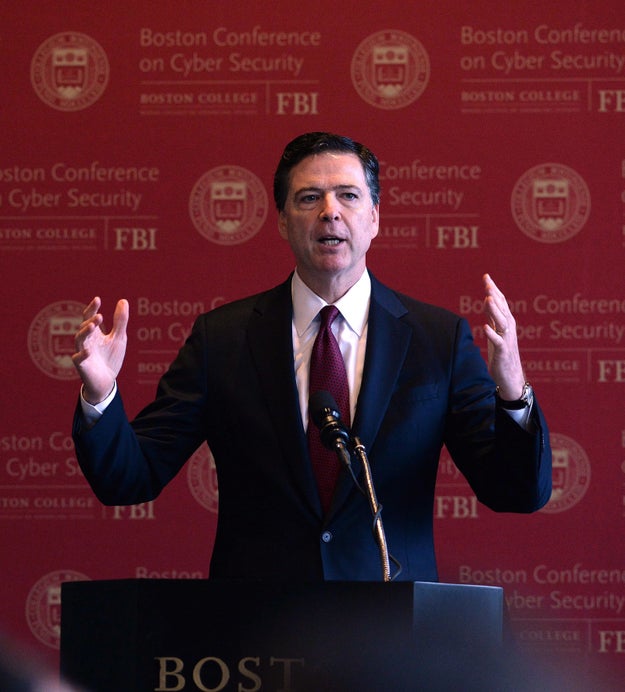[ad_1]

Darren Mccollester / Getty Images
At a cybersecurity conference hosted by Boston College, FBI director James Comey did not discuss his part in the Clinton email scandal, the firestorm over the Russian dossier, President Trump's alarming wiretapping allegations, or unprecedented Russian meddling in the presidential election. Instead, he stuck to that other national controversy in which he maintains a starring role: encryption.
“There is no such thing as absolute privacy in America,” Comey said Wednesday. “That's the bargain. And we made that bargain over two centuries ago to achieve two goals. To achieve the very, very important goal of privacy and to achieve the important goal of security. Widespread default encryption changes that bargain. In my view it shatters the bargain.”
Comey's remarks come just a day after Wikileaks published 9,000 documents and files that it says came from the CIA’s Center for Cyber Intelligence and allegedly detail the agency's ability to hack into phones, laptops, and “smart” TVs.
“It is not the FBI's job to tell the American people how to live.”
To support his argument that ubiquitous, default encryption is limiting the FBI's lawful surveillance powers, Director Comey said the agency received 2,800 devices for which it had had lawful authority to access in the final three months of 2016. The FBI was not able to open 1,200 of those devices, about 43 percent, Comey said. The devices were linked to an array of criminal cases as well as counterintelligence and terrorism investigations and could not be accessed using any technique available to the FBI, Comey added. Although, Comey did not explain how the inability to access those devices impacted investigations.
Comey disputed claims that he is advocating for weaker encryption or so called encryption backdoors into our phones. He insisted, contrary to arguments made by prominent computer scientists and much of Silicon Valley, that firms can retain access to a person's communications while also providing strong encryption. “Here's the deal though: it is not the FBI's job to tell the American people how to live,” Comey said. “I also don't think it's the job of tech companies to tell the American people how to live.”
During the contentious legal dispute last year between Apple and the FBI, many saw the use of metadata and the FBI developing its own in-house hacking expertise as reasonable alternatives to a controversial legal ruling or new legislation on encryption. But Comey said Wednesday that metadata is generally too limited to prove guilt in criminal cases and that building FBI hacking tools would be overly expensive and impractical for broader use.
Comey acknowledged that Americans enjoy a reasonable expectations of privacy in our homes, cars, and devices. But, he added, that with good reason and a court's permission, law enforcement should be allowed to invade our private spaces.
“The advent of default ubiquitous strong encryption is making more and more of the room in which the FBI investigates dark,” Comey said. According to the FBI Director, sophisticated criminals, nation states, and spies have had access to encryption technology for decades, limiting the FBI's ability to monitor their actions. The problem the agency faces now, since the disclosures of Edward Snowden, Comey said, is encryption tools are now widely available, eclipsing a much larger portion of the criminal world from the FBI's view.
“You're stuck with me for another six and a half years.”
Over the weekend, Director Comey asked officials at the Justice Department to publicly reject President Trump's claims that President Obama ordered his phones wiretapped at Trump Tower. But the FBI Director did not address Trump's allegations.
After the election, then President-elect Trump told CBS 60 Minutes that he was not sure if he would ask Comey to resign. In January, however, Trump asked Comey to stay on as FBI Director. At the Boston conference, Comey said he intends to complete his 10-year term. In his opening remarks, Comey said, “You're stuck with me for another six and a half years. And so I'd love to be invited back again.”
Director Comey has been invited by the House Judiciary Committee to speak as a witness during the first public hearing on Russian interference in the presidential election. The hearing is scheduled for March 20.
[ad_2]
